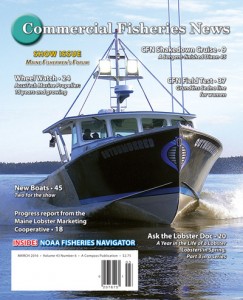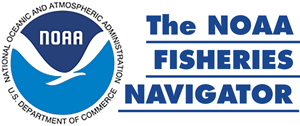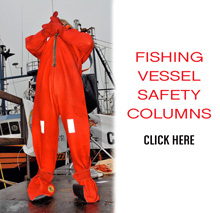It would appear, as this issue goes to press, that a controversial bill to change some elements of the Maine lobster licensing process may be stuck in committee.
If so, we think that is probably not a bad thing.
The bill, widely discussed and well-covered by media within the state, would – among other things – attempt to reduce waiting times for those trying to gain entry into the state’s most productive fishery.
Currently, some 300 fishermen are signed up, waiting for a spot to open in what is – for the most part – a limited entry fishery. Wait times, depending on the zone, can be several years – even a decade or more.
Sponsored by Rep. Walter Kumiega, D-Deer Isle, House chairman of the Marine Resources Committee, the bill includes provisions to change the rules governing the state’s apprenticeship program for entering the lobster fishery.
Currently, entry rules statewide require all potential fishermen to complete an apprenticeship. They are then placed on a waiting list, except for students up to age 18, who automatically receive a license after completion of the apprenticeship.
Kumiega’s bill would increase the age from 18 to 23 before someone is put on a waiting list.
The problem here is not the intent of the bill.
The issue, as we see it, is with unintended consequences – a concern reportedly shared by the Maine Lobstermen’s Association (MLA), the Downeast Lobstermen’s Association (DELA), and the Maine Lobstering Union.
Any change that potentially puts more fishermen and more traps into the fishery at an accelerated pace needs to be considered carefully. That is exactly what the Marine Resources Committee members appear to be doing and we applaud their deliberation.
Among the concerns voiced by MLA Executive Director Patrice McCarron is the state’s need to deal with latent licenses before making any changes that might affect the waiting list process.
There are currently about 1,100 licensed lobstermen in Maine with no reported landings last year, according to the state’s Dept. of Marine Resources (DMR).
If any number of those licenses were to become active the impact to the fishery would obviously be substantial.
As everyone knows, the Maine lobster fishery has been riding a curve of prolonged abundance and prosperity.
Largely self-regulated, it has also proven to be a sustainable fishery in a region where that is no minor claim.
But this fishery, like all others, is cyclical.
Currently, there are those who caution that scientists do not yet know enough about the potential impact of warming ocean water temperatures on the lobster resource. Could we already be on the cusp of the next downward cycle?
We don’t know.
But any significant drop in lobster landings – whenever and whatever the cause – is going to have a huge economic impact on lobstermen and fishing communities across the state.
Is this justification for maintaining the status quo with the lobster licensing process?
Not necessarily.
We see some room for tweaking the process, if that is what a majority of fishermen want.
But we do urge those who make the rules: Tread cautiously before acting. /cfn/
 To get the rest of the March issue of Commercial Fisheries News – please choose from the following options:
To get the rest of the March issue of Commercial Fisheries News – please choose from the following options:
BUY a Single PRINT edition of CFN that is delivered by MAIL.
Click Here for PRINT EDITION
Quickly enjoy ONLINE access with our feature packed flip-book.
PURCHASE ONLINE EDITION
(Read online flip-book immediately with access key and download a copy for yourself. Not sure? SAMPLE HERE)
SAVE BIG when you SUBSCRIBE!







